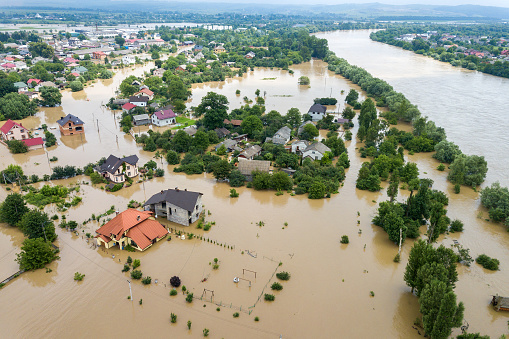New York, March 20 – Decisive political decisions are needed now in the global fight against climate change and developing countries can provide leaders to fulfil the difficult task, the head of the U.N. Development Program said following the publication of the newest scientific report on climate by the Intergovernmental Panel on Climate Change.
“Climate change is deeply unjust,” said Achim Steiner, the administrator of UNDP which leads U.N. development activities around the globe. “Over three billion people — including some of the world’s poorest and most vulnerable communities who have historically contributed the least to the current climate crisis — are disproportionally experiencing its worst effects. It is also holding back their efforts to achieve the Sustainable Development Goals.”
“Yet developing countries are demonstrating that decisive climate action is possible. Through the United Nations Development Program’s (UNDP) partnerships with countries and communities across the world, we are witnessing visionary leadership.”
Sieiner said, for instance, Bhutan, Viet Nam, and India are leading on the adoption of electric vehicles. Kenya and Uruguay are now running on 90 per cent renewable energy sources. And Small Island Developing States and Least Developed Countries are notably taking far-reaching climate action despite a constrained fiscal space and a debt crisis
Steiner said the world has experienced extreme weather with increasing ferocity, from devastating droughts, floods to heatwaves, and “fingerprint of climate change is evident in every corner of the globe.”
“There can be no doubt that the health of people and planet hinges on decisive political action now,” he said.
IPCC’s “Climate change 2023: Synthesis Report,” which studied the science related to climate change, has provided the most comprehensive assessment of climate change in the past nine years. Steiner, like other officials, said the report is “not all gloom” and outlined “how feasible, effective, and low-cost options for climate mitigation and adaptation are already at the disposal of countries across the world.”
“For instance, that includes widespread electrification from clean energy sources, energy and materials efficiency, and the restoration of forests and other ecosystems. It also calls for an increased emphasis on reducing fluorinated gases — human-made gases used in a range of industrial applications — to drive down greenhouse gas (GHG) emissions that contribute to climate change.”
The report said science is clear that keeping the planet’s temperatures at 1.5 C is feasible by implenting measures that would quickly slash carbon pollution and fossil fuel use by nearly two-thirds by 2035.
U.N. Secretary-General Antonio Guterres has called for ending new fossil fuel exploration and for rich countries to quit coal, oil and gas by 2040. Steiner said he supported Guterres’ call for the Acceleration Agenda and for immediate, strong, and sustained reductions in GHG emissions to reach global net zero by 2050.
“Indeed, the adverse impacts of climate change will increase with every fraction of a degree,” Steiner said. “Now is the time for an era of co-investment in bold solutions. As the narrow window of opportunity to stop climate change rapidly closes, the choices that governments, the private sector, and communities now make — or do not make – will go down in history.”
The U.N. has called on high-income countries to fulfil promises to provide $100 billion a year in climate finance to developing countries.
(The following is from U.N. News)
The IPCC study, “Climate Change 2023: Synthesis Report”, released on Monday, March 20 “brings into sharp focus the losses and damages experienced now, and expected to continue into the future, which are hitting the most vulnerable people and ecosystems especially hard, U.N. News said.
It said temperatures have already risen to 1.1 degrees Celsius above pre-industrial levels, a consequence of more than a century of burning fossil fuels, as well as unequal and unsustainable energy and land use. This has resulted in more frequent and intense extreme weather events that have caused increasingly dangerous impacts on nature and people in every region of the world.
Climate-driven food and water insecurity is expected to grow with increased warming: when the risks combine with other adverse events, such as pandemics or conflicts, they become even more difficult to manage.
If temperatures are to be kept to 1.5 degrees Celsius above pre-industrial levels, deep, rapid, and sustained greenhouse gas emissions reductions will be needed in all sectors this decade, the reports states. Emissions need to go down now, and be cut by almost half by 2030, if this goal has any chance of being achieved.
The solution proposed by the IPCC is “climate resilient development,” which involves integrating measures to adapt to climate change with actions to reduce or avoid greenhouse gas emissions in ways that provide wider benefits.
Examples include access to clean energy, low-carbon electrification, the promotion of zero and low carbon transport, and improved air quality: the economic benefits for people’s health from air quality improvements alone would be roughly the same, or possibly even larger, than the costs of reducing or avoiding emissions
“The greatest gains in wellbeing could come from prioritizing climate risk reduction for low-income and marginalized communities, including people living in informal settlements,” said Christopher Trisos, one of the report’s authors. “Accelerated climate action will only come about if there is a many-fold increase in finance. Insufficient and misaligned finance is holding back progress.”
United Nations correspondent journalists – United Nations correspondent journalists – United Nations correspondent journalists – United Nations journalism articles – United Nations journalism articles – United Nations journalism articles – United Nations News – United Nations News – United Nations News

